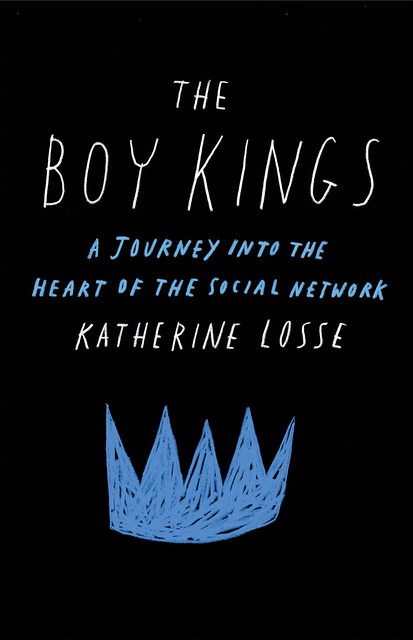
24-Hour Bookclub: The End
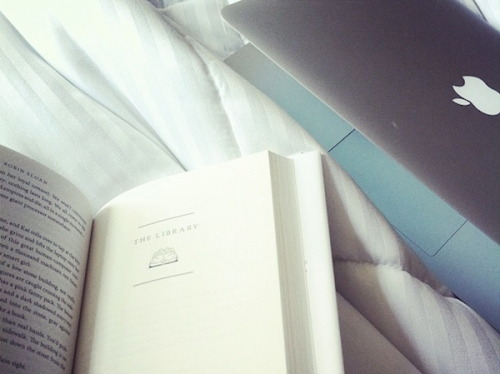
Back in 2012, I started 24-Hour Bookclub with Max because reading a book in a day and talking about it on the internet was about the best fun I’d ever had. Six book selections and several years later, it’s still hard to imagine anything more joyful. I’ve loved our occasional reading flashmob and all the people I’ve met through it. Even so, I’ve decided that it’s time to say goodbye to 24-Hour Bookclub. I’m writing this post as an epilogue to the decision to close this chapter of my life and as a testament to everything good that came of the decision to open it in the first place.
Between October 2012 and June 2014, members of 24-Hour Bookclub devoted six days to reading six books:
- October 6, 2012: Mr. Penumbra’s 24-Hour Bookstore, by Robin Sloan
- January 6, 2013: Both Flesh and Not, by David Foster Wallace
- May 5, 2013: The Particular Sadness of Lemon Cake, by Aimee Bender
- June 9, 2013: These Days, by Jack Cheng
- October 20, 2013: The Boy Kings, by Kate Losse
- June 7, 2014: The Hotel Eden, by Ron Carlson
Across those six days, I’d estimate that 100 different people read at least one of the books in a single 24-hour stretch, writing about 1,000 tweets in the process. Over 1,000 people followed @24hourbookclub on Twitter; over 300 joined the mailing list. 24-Hour Bookclub played a role in connecting Lisa with her dream job, and sparked more than a few friendships. And at one point, 24-Hour Bookclub even made an appearance in WIRED Magazine — in print!
But metrics and milestones are only a fraction of the story. What mattered most to me about 24-Hour Bookclub were the moments we got to experience together.
Moments
For Mr. Penumbra’s 24-Hour Bookstore, some friends got together in Dolores Park to read together. Meanwhile, Ed and I tweeted exactly the same thing at exactly the same time:
“He’s the warrior, you’re the wizard, I’m the rogue. This conversation never happened.” @robinsloan has me cracking up. #24hourbookclub
— Ed Cormany (@ecormany) October 6, 2012Laughing on p. 159: “He’s the warrior, you’re the wizard, I’m the rogue. This conversation never happened.” #24hourbookclub
— Diana Kimball (@dianakimball) October 6, 2012@ecormany WE REACHED AND LAUGHED AT THE SAME SENTENCE WITHIN SECONDS OF EACH OTHER. @robinsloan, magic is afoot…
— Diana Kimball (@dianakimball) October 6, 2012After it was all over, I wrote about the jack-o’-lantern chocolates that had sustained me and the practicalities of reading Twitter and a book in parallel:
I poked my head up every couple of chapters to check Twitter, reply to people, retweet fun thoughts. My double bed (my favored reading place, aka the only comfortable surface in my dorm room) became command central: computer at my side, phone blinking with Twitter notifications, book nestled in the folds of the comforter whenever I had to set it down.
For Both Flesh and Not, one club member in New Zealand stepped up as our “International Date Line start gun guy,” since he couldn’t join the reading that time. Ed, a linguist and a tennis fan, had somehow never read anything by David Foster Wallace before, and wrote about the experience. A group of us reflected on the essays over on Branch. (Miss you, Branch.) This was also how I first met Libby, who was working on Branch at the time, and who has since become a dear friend of mine.
The Particular Sadness of Lemon Cake was our first reading led by Elaine, who managed the conversation with such grace that I later asked her to join us as a third full organizer. Sara marked the occasion not with lemon cake, but with scones and clotted cream. Later, Laurel found a mysterious note in her library copy.
For These Days, we three organizers spent an afternoon reading together in person at the Chicago Botanic Garden:
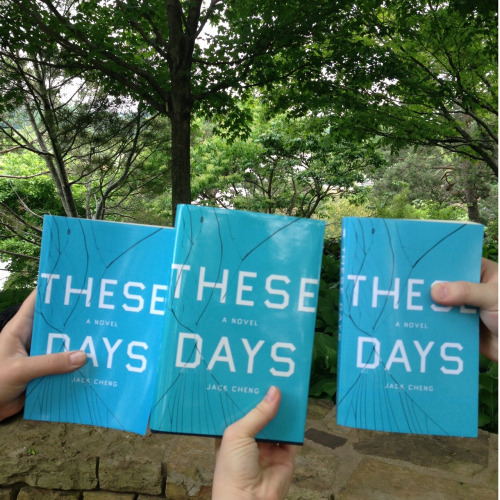
At the end of the day, the author, Jack Cheng, joined readers for a Q&A, and Sara recorded some reflections.
For The Boy Kings, a few of us got together in Berlin to read together in person. Kate Losse also agreed to join us for a video Q&A. This was a really big deal to me, because while I’d known Jack for years before asking him if he’d be willing to do the Q&A, I didn’t know Kate at all. That is, until the fateful Q&A, during which we got along so well that we ended up grabbing dinner the next time I was in San Francisco.
For The Hotel Eden, Anastasia took to the beach and Ron Carlson was kind enough to join us for a written interview facilitated by Elaine, which included this wonderful moment:
@PhatypusComics asked: How do you personally know when you’re done revising a page/story? My stories have all (100 percent of them) surprised me, so the endings have been surprises too, and somewhat mystifying. When I wrote the last line of “Zanduce” it felt like I’d stuck the landing in a gymnastics meet. Other times, you circle the mystery without answering it, move the needle above 89 to 90 — or so you think — and call it done. It goes in a drawer until all of the affection subsides and you can design an ending. No story comes in at 99 or 100. We’re not going to live and die by a single story, but by the call of the next one. Something like that.
Beyond individual moments, what’s stuck with me most is the warmth of return. Reading for the sake of reading — irresponsibly, with abandon and devotion — reconnects us with our origin stories. Through participating in 24-Hour Bookclub, Jack, Sara, and Lisa have all noticed the same thing.Lisa’s observation rings especially true to me:
It’s hard sometimes to stand on the other side of a craft you’ve known and loved, in all of its complexity, and to stop yourself from peeking at the wizard behind the curtain — to be a dancer in the audience, a writer reading, or a photographer taking a turn in front of the lens. It’s worth it, though, I think, to take moments away from the how of it all and return to the beginning of wonder.
A return to the beginning of wonder. That’s the space we held together.
The End
October, January, May, June, October, June: 24-Hour Bookclub was always occasional. Once I realized recently that an occasion hadn’t arisen in a while, I started thinking about what it would mean to close down 24-Hour Bookclub officially. Could I let go of the promise to do it again?
Not long after I started 24-Hour Bookclub, I started thinking deeply about the role of projects in my life. Those reflections — set in motion by a talk my friend Christina gave at Brio in April 2013 — snowballed into an essay titled “No More Forever Projects,” originally published on The Pastry Box in March 2014. In it, I came to some conclusions about endings:
My friend Jamie Wilkinson once told me about a decision he’d made. No more forever projects, he said. From now on, every project is one-time-only. Treat beginnings like endings: celebrate them, document them, let someone else pick up where you leave off. If the project’s worth repeating, there’s nothing to say you can’t still be the standard-bearer. But at least it’s a choice. By ending well, you give yourself the freedom to begin again.
But endings are hard to bring about. While my perspective shifted over the course of 2014, there were precious few doors that I actually closed. In December 2014, I wrote a follow-up essay titled “Letting Go”:
This is what I need to do next: hold every project, every object, every belief in my hands — one after another — and ask, does this stand for joy, obligation, or fear? And if it’s time to let go, I will.
While 24-Hour Bookclub once stood for joy, and while the memories still do, I have to admit that since the last reading in June 2014, I’ve felt more obligation than anticipation. It’s time to let go; I will. By really and truly ending, I hope to celebrate everything we built together while opening up space for whatever may be next.
Epilogue
Over the years, people have occasionally asked me about turning 24-Hour Bookclub into a platform — an event pattern that anyone could run with, combined with a clearinghouse for discovering reading flashmobs you might want to join. Historically, I’ve held off; part of me was interested in preserving the oneness of the 24-Hour Bookclub experience, while the other part of me just thought it sounded like a lot of work to open it up. Now that I’m closing the door on my involvement, though, I’d like to fulfill the promise of “No More Forever Projects” and give others a chance to pick up where I’m leaving off.
24-Hour Bookclub is a lot of things: a website, a Twitter account, a hashtag, an idea. My plan is for the website and the Twitter account to remain as archives, but the hashtag and the idea are fair game to carry forward. To support anyone who’d like to give the idea a try, I’m making our 24-Hour Bookclub handbook public. This post full of tips for readers could also prove useful.
24-Hour Bookclub is one of my favorite things I’ve ever done. As I once wrote:
Imagine a giant, quiet library full of people who are all on the same page of the same book at the same time. The silence is punctuated only by shouts of glee, echoed by others as they reach the same point in turn. 24-Hour Bookclub is like that.
If you’ve ever read a book because of 24-Hour Bookclub: thank you. Your glee and dedication made it all worthwhile. My deepest thanks to Max and Elaine for bringing 24-Hour Bookclub to life in the first place, and for supporting me in this decision. If there’s one thing I’ve learned from 24-Hour Bookclub, it’s that the warmth of return is within reach for all of us.

A totally delightful Q&A with author Ron Carlson on The Hotel Eden: “I did what a writer does: kept typing”
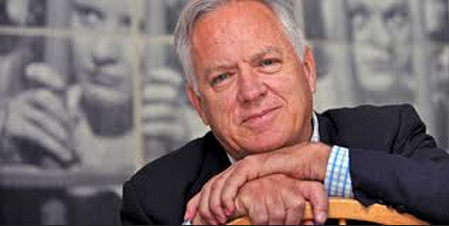
@PhatypusComics asked: How do you personally know when you’re done revising a page/story?
My stories have all (100 percent of them) surprised me, so the endings have been surprises too, and somewhat mystifying. When I wrote the last line of “Zanduce” it felt like I’d stuck the landing in a gymnastics meet.
Other times, you circle the mystery without answering it, move the needle above 89 to 90–or so you think–and call it done. It goes in a drawer until all of the affection subsides and you can design an ending. No story comes in at 99 or 100. We’re not going to live and die by a single story, but by the call of the next one.
Something like that.
@ink_teef asked: How do you partition parts 1,2 and 3? When you compare The Hotel Eden, a story that’s almost ghostly with a fantastic and suddenly dangerous character like Porter, with something as skewed and satirical as What We Wanted To Do, it’s hard to find a thread that puts them in the same collection. Can you elaborate on that?
A writer gets to be a lot of people, sort of has to be. You write stories over a few years and they’re unified by what? I’m not sure.
I’ve been so lucky to have been met by readers tolerant of the different worlds/modes of my prose. A notion like “A Note on the Type” appears and I treat it with everything I’ve got. I don’t look at it and say, that doesn’t fit the them; that doesn’t seem like a Ron Carlson story. (It sort of is the quintessential RC story). I like to say I’m a regional writer but I haven’t really settled on my own region.
@s0delightful asked: What seed do your stories start with? A feeling, a character, a scene, a turn of phrase?
All. I love to start with an image, or an event; I write from what I know toward what I don’t. Porter in the title story was based on one of my dearest friend, when he turned in the story and it opened to show him darker than anyone I’d ever written I was shocked, but I did what a writer does: kept typing.
@smwat asked: What is the process of tying these stories together?
Grouped them in this book (as in the previous two collections) with the whimsey (not the right word) in the middle.
@tommygents asked: Who in God’s name are your influences?
A great question, but hard to answer. I’m high school class of ’65, so luckily a lot of that music, then Cheever, then my dear teacher David Kranes, then the thousand stories I’ve read, and of course old movies, all the universal monster movies.
“Keith” was written after a Wilber Daniel Steele story, an ancient story titled “How Beautiful with Shoes” and I carried the collected Emily Dickinson around in a thrift store sport coat for the great year I was twenty. Richard Brautigan with “Trout Fishing” and now Annie Proulx and the early Anne Beattie, and Mr. C. McCarthy, and Fitzgerald–my first novel is “Betrayed by F. Scott Fitzgerald”–and Hemingway.
And probably the Rand McNally Atlas from where I take names as well as the Yellow Pages and the Joy of Cooking.
Hemingway remains a giant.
@ink_teef asked: Most of your stories in this collection deliver the turn, the jolt or the realization via some romantic connection. Do you feel that drive for human connection is a theme you try to work a story around, or is it just a natural take for you as an author ie. does it result from a world view you hold based in human connection?
You’re onto something with this and I’m not sure of the answer, but I think the longing for connection is shot through the work. I have never worked for theme or toward it, but from event and I write as closely as I can trying to get lost in the inventory and survive the draft. This doesn’t mean there isn’t a yearning in me for connection, for memory, for the other side of the echo. Is that even phrase?
@dianakimball asked: I’m interested in your perspective on “kill your darlings” as applied to prose writing?
I hear that phrase and I’m not sure at all that I’ve applied it. I’m an includer and I can see looking back at the stories that I have spilled left and right at points, but I work to make the story function first. In my first novel, you can see the writer saying “Look Ma! I’m writing!”
I’m not interested in that now at all. A story needs to be dense and have the proper number of threads per inch, but I’ll forgo a witty note if it is a sideshow. I’m a good editor and not precious about my work.
Thanks to all who read and boozed and tweeted today. We had a wonderful time.
Oh, and from Ron: “I so appreciate taking part of your day for this book.” We did, too, Ron.

A few reflections
Just starting #24hourbookclub but on the beach with a cup of wine, so we’ll see how this goes… pic.twitter.com/3qj6ngVn6e
— Anastasia (@aaanastasia)June 7, 2014
Did “Nightcap” take an abrupt turn from melancholy to macabre for anyone else? #24hourbookclub
— Rebekah Heacock (@rebekahredux)June 7, 2014
I can’t help but picture Zanduce on like the fourth killing, where he’s just like, “Ah, shit. I guess this is a THING now.” #24hourbookclub
— Tommy M (@tommygents)June 7, 2014
i wondered when the 90s would show through — “a thousand-dollar watch and a real nice Walkman” — there it is. #24hourbookclub
— Ed Cormany (@ecormany)June 7, 2014

“Why don’t you just drop him and fall into this baker’s bed, where you’ll be coated in frosting and treated like a goddess. I’ll put you on a cake; I’ll strew your path with powdered sugar and tender feathers of my piecrusts, for which I am known throughout the Intermountain West.”
-
“Dr. Slime”, The Hotel Eden by Ron Carlson,

Q&A with author Ron Carlson: GO!
Time to tweet your questions/comments for our Q&A post with author Ron Carlson! Just ask here and hashtag #24hourbookclub #questionthought
— elaine short (@ink_teef)June 7, 2014
I’ll send Ron the Q&A at 4pm CDT/2pm PDT. I’ll post his answers before 6pm CDT/4pm PDT. GO! #24hourbookclub #questionthought
— elaine short (@ink_teef)June 7, 2014

We out here, we out here
Just getting started on the west coast. #24hourbookclub pic.twitter.com/MP1BQrjxTE
— Kendra Albert (@KendraSerra)June 7, 2014
“Our enemies are manifold and voracious and generally rude.” Welcome comic relief in story six. #24hourbookclub
— Rebekah Heacock (@rebekahredux)June 7, 2014
“She held on as he took the corners too fast…but all the way home she didn’t put her chin on his shoulder.” A distant ache. #24hourbookclub
— Diana Kimball (@dianakimball)June 7, 2014
#24hourbookclub also I want to go back and find the pivot sentence in each of these stories
— Sara M. Watson (@smwat)June 7, 2014
After each story I feel very full and satisfied but also so hungry. I guess I’ll go make a baked potato before story #3. #24hourbookclub
— Amy Lou (@symphyotrichum)June 7, 2014

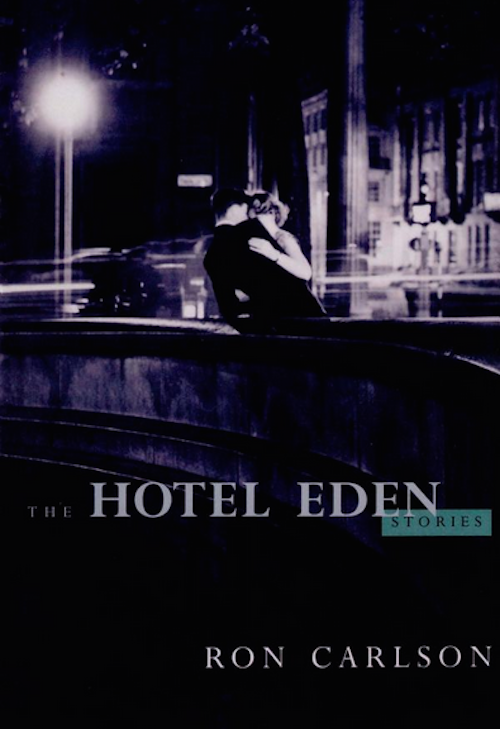
This is the time of year that makes me want to sink my teeth into juicy things; plums and peaches; a crush’s lips; a really, really, very good book with prose as simultaneously poetic and simplistic as those thick emotions we can’t fully express, but that masterful fiction can, somehow.
On Saturday, June 7th, 24-Hour Bookclub and I will both take a very deep, satisfying bite into an excellent collection of short fiction: Ron Carlson’s The Hotel Eden.
It’s worth explaining how we came to June's The Hotel Eden.
In college I was fortunate enough to be handed a copy of The Signal, a novel by Carlson that starts out heady with the vague misfortune of a down-on-his-luck, soon-to-be-divorced Wyoming rancher named Mack. As I travelled into his past–deeds Mack himself couldn’t seem to face through his own flashbacks–I became intertwined with a complex character; his morals and his failures and how one seemed to feed the other in an unfair, all-to-common way.
Then, about three-quarters of the way through, the novel jumped up. The plot and narrative jolted, bolting into a new state like a kid caught sleeping in class. It became a thriller, a chase, and if Mack could just make it out alive then his purpose, his sense of self and morality and what-is-fucking-right would, for once, win. Boy, this book did a number on me.
I expect the same satisfaction from Carlson’s 1998 collection of 12 critically acclaimed short stories. Because Carlson can deliver the reward of sensations that only comes from expertly crafted, complex, downright-joyous-to-read fiction. I cannot express how excited I am to take that first, big, sloppy and juicy bite.
Max, Diana and I will be there. Won’t you join us?
We’ll wake up first thing in the morning, crack open our copies of The Hotel Eden, and start tweeting up a storm using our usual #24hourbookclub hashtag. We’ll be looking out for your tweets, too, and reading them between chapters.
You can pick up a copy of The Hotel Eden
I can’t wait.
-Elaine

Artifacts that tie us together
I have really enjoyed reading and contributing to Uncommon this year, so I was honored when Brian asked me to write one of the year-end essays for the dispatch. Each one looked at listening, watching, and reading in turn. Here’s what I shared on reading:
[…]
Books are the things we reference to start a conversation. They are shorthand for complex ideas, characters, images, contexts. They are the nodes that connect us. They offer common ground.
I realized how important a sense of place in reading was to me when I joined a “flashmob” of internet friends reading books together with 24-Hour Bookclub (spearheaded by Diana, who incidentally also introduced me to the Uncommon community). Sharing glimpses of our reading environment felt like we were all reading together, no matter where we were geographically distributed. And in our tech book club gatherings here in Boston, I’m always fascinated to see the variety of artifacts placed on the table when we come together to talk about our reading experience. The words we read are the same, but our contexts are different.
The books we love are artifacts that tie us together. They are units of culture and of commonality. We just have to look up from our paperbacks and our iPads every once in a while to catch who else is reading along with us.
Subscribe to Uncommon and essays like this one will float into your inbox every Tuesday, like sundial clockwork. Seeing 24-Hour Bookclub show up in the latest, by Sara, made us smile so hard.

G+ Hangout with Kate Losse
We’re chatting with Kate Losse, author of The Boy Kings, our pick for today’s 24-Hour Book Club. Come join us right now.

Join us this Sunday for 24-Hour Bookclub
I first discovered Readmill in January as I was searching for a way to take part in 24-Hour Bookclub. As far as I could tell, Readmill was the most beautiful, quiet way to read while also sharing highlights and participating in the discussion. Soon enough, I was reading everything I possibly could with Readmill on my phone.
Just a couple of weeks ago, I moved from Atlanta to Berlin to join the Readmill team as Community Manager. And, as it turns out, I’ve arrived just in time for the one-year anniversary of 24-Hour Bookclub.
This Sunday, October 20, I’ll be reading along with 24-Hour Bookclub from the Readmill headquarters in Berlin. We’ll be reading The Boy Kings by Katherine Losse, and anyone can join.
I’d love to read together from 4 to 7pm, if you’re here in Berlin, and throughout the day with Readmill from anywhere. Just send me a note at lisa@readmill.com if you plan to stop by.
Happy reading!
P.S. Please be in touch about all things reading and Readmill too. I love notes (especially when they contain book recommendations), and I can’t wait to hear from you.
If you happen to live in Berlin, swing by Readmill HQ tomorrow to read with me and Lisa!

